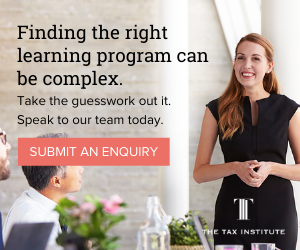Queensland State Chair and Partner at Deloitte Private, John Ioannou, CTA says that while tax technical expertise is crucial for success in tax, it doesn’t guarantee a “seat” at the game.
John was admitted as a solicitor in 2002 and is a Partner at Deloitte Private. He has experience in the areas of taxation, structuring, trusts and estate, succession and asset protection planning. He is currently Queensland’s representative on the Institute’s National Professional Development Committee, a member of Queensland’s State Council, and elected 2019
State Council Chair.
State Council Chair.
We caught up with him at the 34th National Convention in Hobart.
“Some of the insights I've taken away from the Convention, as always, is really the opportunity to see other people’s perspectives on issues that you come across in practice,” he says.
“When you've been in practice for a little while it's not often the case that something takes you by surprise, unless you're dealing with new law.
But I always enjoy hearing from other practitioners and how they've dealt with particular issues because it’s helpful when you go back to the office and can bring back different perspectives.”
So why a career in tax?
“What I really enjoy about tax is the problem solving,” he says.
“You can tell that you're helping them get to where they need to be by unburdening them with tax-related issues that they really struggle with.”
Tax education “absolutely critical”
John says education in the tax profession is essential.
“The reason for that is the areas we practice in are complex, technical, and detailed,” he explains.
“There'd be very few people who would be able to just to throw themselves into the deep end, immerse themselves in particular areas of tax, and just come out knowing it all.
“Being able to enter into an education program that gives you a framework to start pigeon-holing information as you gather it, is essential.”
However, John says there is more to the experience.
“Tax technical is a ticket to the game, but it no longer guarantees you a seat,” he points out.
“With the advent of technology, it's really taken away the gatekeeper role that's traditionally been held by tax advisers.

“People now can access technical content, so in providing services to clients, yes they assume that you have technical competency, but what they're really looking for is a better quality of experience.”
John says that from a user perspective, it is really the only thing that clients can judge, quickly and for themselves.
“Bedside manners are as important, if not more important, than technical ability,” he adds.
“The Chartered Tax Adviser designation has been important to me, because it's something that I can use to help explain to others where I am with my professional abilities and skillset.”
Why he loves being a member of the Institute
“My enthusiasm for The Tax Institute starts a long way back, but for me it was really the opportunity to immerse myself in a profession,” says John.
“The Tax Institute has been a pool of opportunity; it's really opened up doors that I wouldn't otherwise have been able to get into, and I like the way that as an organisation we do think of ourselves more as a community.
“I love being able to come to events or even being part of the organizing committees, where you can see the old
guard helping the newcomers into the profession, and developing not only just the technical skillsets, but also other skillsets that'll serve them well in the profession.”
guard helping the newcomers into the profession, and developing not only just the technical skillsets, but also other skillsets that'll serve them well in the profession.”
John says being a part of that is something special and as fulfilling as just practicing tax.
The future of tax: “quite exciting”
John says that technological advancement will allow tax professionals to fast track a lot of the “menial tasks”, which in theory should give us more time to spend with clients and solving more complex problems.
“Having said that I do think that in the future a tax professional will have to be mo re of a concierge or project manager,” he
explains.
explains.
“And that's not to say that we will have to be generalists, but we will have to have an appreciation of a broader range of issues.
“To the extent that some of us are trusted advisors, it's really then understanding where your skillset is, but being able to direct clients to more appropriate professionals for particular areas.”
Tax is a “people business”
John’s advice to new practitioners in tax would be to maintain a strong peer network.
“You can do a lot of things on your own, but I have really valued the ability to being able to tap into a peer network, and just test my ideas or perspectives,” he says.
“Ultimately, what we do, it's a people business; we're not manufacturers.
“It's a people business, so in my mind it makes sense that you have to be able to connect with other people, who play in the same space, because that's really invaluable and could only improve what your delivering to your clients.”
x








